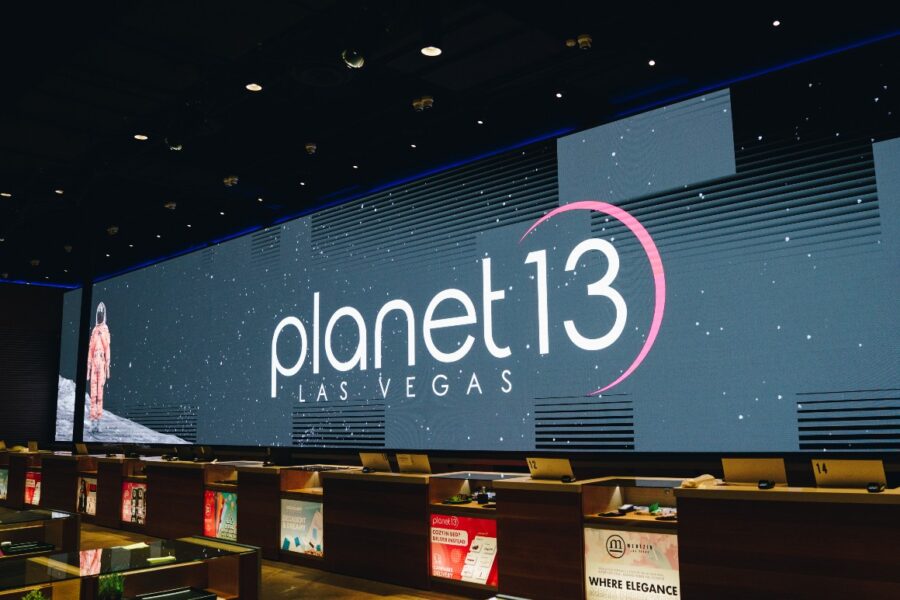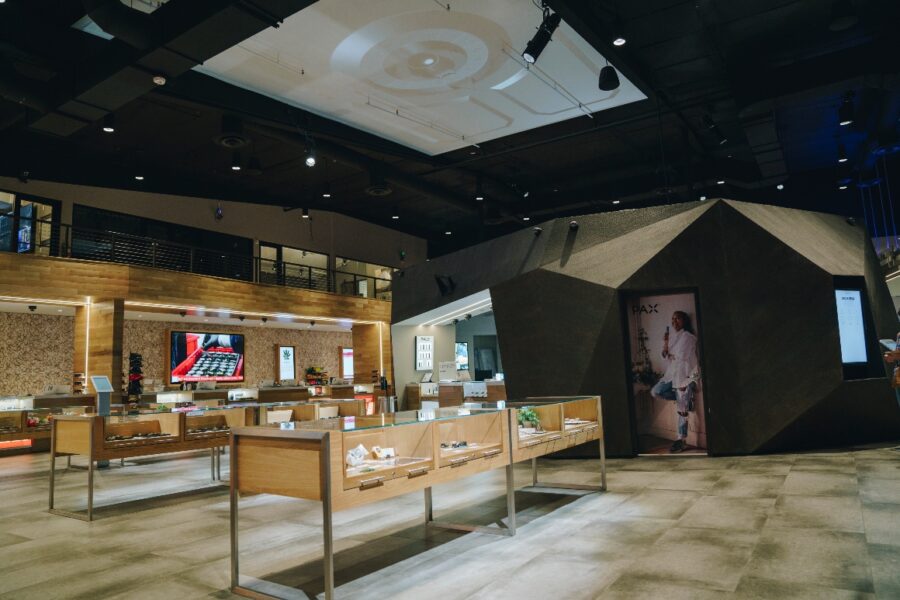Weed lounges are coming to a city near you

LAS VEGAS — Planet 13’s cannabis “superstore” on the Strip has 30,000 square feet of retail space alongside a cafe, a bar and a marijuana processing center, all behind a glass wall where customers can see the various contraptions used for making cannabis products.
But there’s one thing missing: a place to smoke weed.
In a city where tourists light up cigarettes on casino floors and stumble out of bars carrying plastic cups filled with booze, public cannabis consumption is conspicuously restricted in Sin City. The masses of tourists buying cannabis products at Planet 13 have almost nowhere to smoke it legally — not on the sidewalk and not in their hotel rooms.
That will soon change. Nevada is the latest state to allow cannabis consumption lounges as the drug gains mainstream acceptance. As regulators grapple with how to oversee the businesses, dispensaries are already making plans to open the first state-sanctioned lounges by mid-2022.
The politics of pot lounges are changing along with shifting social mores around the substance. While Colorado and Washington were the first states to legalize adult use in 2012, it wasn’t until 2019 that Alaska first adopted a law on cannabis consumption lounges. Other states have since followed suit.
Planet 13’s cannabis lounge will have no shortage of Vegas-style excess. The company is planning an 8,500-square-foot consumption lounge, complete with a “grand staircase” leading up to a 5,000-square-foot balcony that will have a 4-inch-deep splash pool.
“You take your shoes off. You dance in the water. You consume cannabis, and there’s 100,000 rooms looking down on you from the Vegas towers,” said Planet 13 co-CEO Larry Scheffler, gesturing around a cavernous warehouse space that will one day house the weed lounge. “[There] will be like nothing like it in the world when we finish it.”
So far, no major U.S. city in any weed-legal state has emerged as an Amsterdam-like destination where consumers can freely light up in ubiquitous cannabis cafes.
Las Vegas could fill that void.

At least, that’s what Clark County Commissioner Tick Segerblom hopes. Segerblom is a former state senator who spearheaded medical marijuana legalization efforts in 2013 and was an enthusiastic backer of the 2016 adult-use legalization initiative. There’s even a marijuana strain named after him: Segerblom Haze.
“I’ve been talking about [cannabis lounges] from day one,” said Segerblom, who tried to pass a social consumption bill in the state Senate in 2017. “It’s such a perfect thing for Las Vegas — for who we are.”
While the hotel industry opposed Segerblom’s bill in 2017, increasing societal acceptance is changing the politics of cannabis consumption. Plus, hotels in Vegas now have to contend with rule-flouting guests and other customers who do not enjoy the pungent scent of cannabis. Giving tourists a legal place to light up could cut down on weed smoking where it’s not allowed.
How we got here
When states started to adopt marijuana legalization laws, provisions for public consumption were noticeably absent. Perhaps attuned to the specter of pot cafes driving away otherwise sympathetic voters, early legalization initiatives included bans on public cannabis consumption.
Alaska became the first U.S. state to allow consumption lounges in 2019, but three years on, they are few and far between thanks to the high cost of compliance and local restrictions. Consumption lounges in Illinois, which are BYOB(ud) only, are off to a slow start, and not a single lounge has opened yet in Michigan. Onerous regulations have prevented weed cafes from spreading throughout California and Colorado, with only a handful dotting major cities.
But that’s about to change. Lawmakers in Colorado and California have enacted legal changes that will make it easier to open pot cafes. Denver will start accepting applications from social equity applicants for cannabis hospitality licenses this week. In addition, New York and New Mexico’s recently passed legalization bills allow on-site cannabis consumption, while Connecticut lawmakers left open the possibility, directing regulators to make recommendations.
In a more mature cannabis market like Nevada, introducing new licenses for consumption lounges is seen as a way to bolster social equity when the market is already saturated. The state has plenty of dispensaries, but only one consumption lounge exists on tribal land, operated by the Las Vegas Paiute Tribe.
While existing dispensaries will be able to apply for a single consumption lounge license, regulators can also issue up to 20 independent cannabis lounge licenses before July 2022. At least half of those licenses must go to social equity applicants, which the law defines broadly as a business owned by people “adversely affected” by the criminalization of cannabis.
Some retailers are still a year out from building out their planned lounge spaces, said Layke Martin, executive director of the Nevada Dispensary Association, last month during a panel at MJ Unpacked. That’s because a cannabis lounge has air quality and odor issues that businesses like restaurants and bars don’t have to contend with.
“What you think you’re going to spend, you’re probably going to spend double,” said Jenn Tramaglino, CEO of Cannect Hospitality, at MJ Unpacked. “You’re looking at not only having an HVAC system for your entire space, but for each of the individual spaces inside it.”
That raises questions about whether social equity applicants — who often struggle to raise cash — will have sufficient capital to create viable businesses.
Clark County is planning to start a fund for social equity applicants from its municipal marijuana revenue. The county spends $12 million in marijuana revenue a year on homelessness programs. Any amount of revenue that the county makes above that $12 million will go towards funding social equity applicants and some other marijuana-related initiatives. The county estimates it will collect $18 million this year, the Las Vegas Review Journal reported.
Earlier this month, the Cannabis Advisory Commission advanced draft rules for consumption lounge regulations. Aside from social equity, they have other thorny issues to contend with.
Nevada law only allows lounges to sell single-serving products, which means consumers can’t bring home any leftovers.
Could that incentivize people to over-consume? What is a “single serving” of cannabis anyway, when different people experience vastly different effects from the same product? Will there be limits on how much cannabis a person is allowed to consume at a lounge in one visit?
Chelsea Bedard, chief revenue officer of cannabis beverage brand CANN, sees lounges as an opportunity to show cannabis-naive consumers that the substance can be an alternative to alcohol. CANN specializes in producing micro-dosed cannabis beverages; the company’s most potent seltzer only has 5 mg of THC.
“It’s really allowing us to introduce first-time and canna-curious people to the space because we are giving them something that they’re already familiar with,” she said at MJ Unpacked.
The future of weed consumption in Sin City
The Source, a cannabis company with four locations in the Las Vegas area, mostly serves locals who are “happy to get their product and go home and consume,” said CEO Simon Nankervis.
But the company plans to open a new dispensary in the Arts District — a neighborhood filled with craft breweries, small galleries and vintage clothing shops — and use that location for its consumption lounge. A consumption lounge is “in keeping with the way people socialize in that part of the city,” Nankervis said.
He hopes that the regulations will allow businesses to have outdoor consumption areas.
“The weather is amazing [in Nevada],” Nankervis said. “Al fresco dining is available year-round, why wouldn’t we be able to have al fresco consumption lounges?”
But some Vegas weed advocates are dreaming much bigger. Segerblom envisions a day when people can toke up in a Pilates class or massage studios, or even puff on a joint while getting a haircut.
“Lounges are just the first step,” he said. “It’s going to be insane.”
Go To Source
Author: POLITICO

